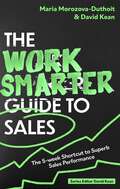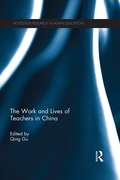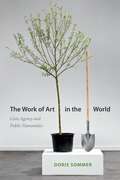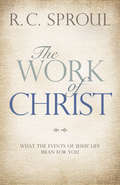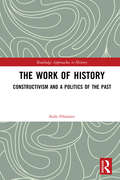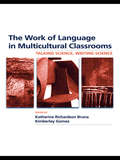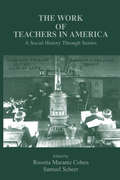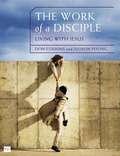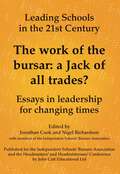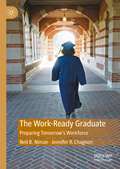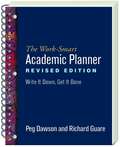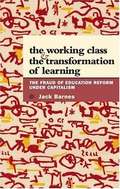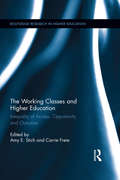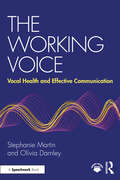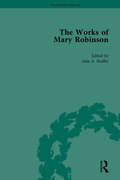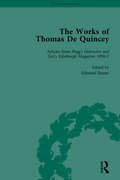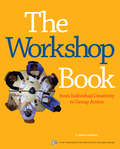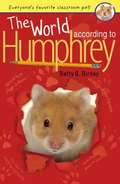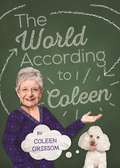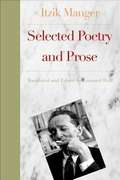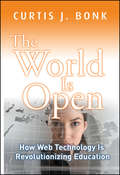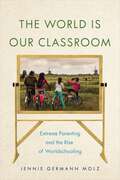- Table View
- List View
The Work Smarter Guide to Sales: The 5-week Shortcut to Superb Sales Performance (Work Smarter Series)
by David Kean Maria Morozova-DuthoitSome people are born with a natural 'go-get-'em' approach. For most of us, however, selling does not come naturally. This book demystifies the art of getting people to buy - whether it is as simple as convincing your friends to agree to your restaurant recommendation, or as complex as getting people to buy your million- dollar proposal at work.The book is a toolkit for self-exploration, analysis, learning and action plan development framed in a 5-week programme for building your unique sales self. Setting a clear objective for every week, it takes the reader through a simple 5-step programme: - Setting the foundation: the main principles of sales- Rational aspects of sales - Emotional aspects of sales - Connecting the dots: closuring and continuation of the sales cycle - Creating your personalised action plan and toolbox with aide memoires, frameworks and life hacks to use every dayEach chapter concludes with a summary of do's and don'ts. The last chapter includes practical tools for analysing and planning your own self-development and business development. It will accelerate your understanding of and ability to sell by raising both your self-awareness and selling self-confidence.The 'Work Smarter' series:Our books provide shortcuts, tips and life-hacks for the development of essential business skills. The books bring together accomplished industry experts who have learned their trades at the coalface. They teach the skills ambitious businesspeople need in order to tip the playing field in their favour. It is the pirate equivalent of business advice; the antidote to conventional wisdom; 'smarter' practice over 'best practice'.
The Work Smarter Guide to Sales: The 5-week Shortcut to Superb Sales Performance (Work Smarter Series)
by David Kean Maria Morozova-DuthoitSome people are born with a natural 'go-get-'em' approach. For most of us, however, selling does not come naturally. This book demystifies the art of getting people to buy - whether it is as simple as convincing your friends to agree to your restaurant recommendation, or as complex as getting people to buy your million- dollar proposal at work.The book is a toolkit for self-exploration, analysis, learning and action plan development framed in a 5-week programme for building your unique sales self. Setting a clear objective for every week, it takes the reader through a simple 5-step programme: - Setting the foundation: the main principles of sales- Rational aspects of sales - Emotional aspects of sales - Connecting the dots: closuring and continuation of the sales cycle - Creating your personalised action plan and toolbox with aide memoires, frameworks and life hacks to use every dayEach chapter concludes with a summary of do's and don'ts. The last chapter includes practical tools for analysing and planning your own self-development and business development. It will accelerate your understanding of and ability to sell by raising both your self-awareness and selling self-confidence.The 'Work Smarter' series:Our books provide shortcuts, tips and life-hacks for the development of essential business skills. The books bring together accomplished industry experts who have learned their trades at the coalface. They teach the skills ambitious businesspeople need in order to tip the playing field in their favour. It is the pirate equivalent of business advice; the antidote to conventional wisdom; 'smarter' practice over 'best practice'.
The Work and Lives of Teachers
by Cohen Rosetta MarantzThe Work and Lives of Teachers offers a simple but original argument: that the cultural attitudes toward the teaching profession measurably influence how students perform. Cohen uses both ethnographic portraits and personal accounts from thirteen teachers - from Finland, Taiwan, Greece, Azerbaijan, France, Chile, South Africa, Siberia, Brazil, Romania, Philippines, Norway and the United States - to explore the meaning and value of teaching worldwide. This study includes the ways in which teachers in these countries are educated, recruited, compensated, and perceived by parents, students, administrators, and the culture at large. Teachers' voices, so rarely heard in international educational studies, are front and center here, highlighting the daily work in the classroom and the pleasures and struggles of engaging in the teaching profession in 2016. The lesson, briefly stated, is that societies are only as good as the people who teach in them.
The Work and Lives of Teachers in China (Routledge Research in Asian Education)
by Qing GuBy bringing together a distinguished group of scholars who have deep, extensive and complementary knowledge and expertise of the Chinese education system, The Work and Lives of Teachers in China engages in detailed discussions on contemporary issues about teachers and teaching in China. It locates teachers’ work and lives in a critical analysis of the political, socio-cultural, ideological and educational reform contexts, and through this, demonstrates how teachers in different professional life phases and in different schools are able to retain their vocational strength and commitment for learning and development. Using rich illustrations from real teachers in real primary and secondary schools, this book represents a collection of scholarly writings which build research and practice informed new knowledge about the nature of teachers’ work and lives in China. Through these comprehensive case studies, the book illustrates to policy makers, head teachers and training and development organisations the importance of sustaining teachers’ commitment and wellbeing in their efforts to improve quality and standards in today’s Chinese schools. The Work and Lives of Teachers in China provides valuable insight for policy makers, educators, researchers, teachers and students in education and beyond.
The Work of Art in the World: Civic Agency and Public Humanities
by Doris SommerCelebrating art and interpretation that take on social challenges, Doris Sommer steers the humanities back to engagement with the world. The reformist projects that focus her attention develop momentum and meaning as they circulate through society to inspire faith in the possible. Among the cases that she covers are top-down initiatives of political leaders, such as those launched by Antanas Mockus, former mayor of Bogotá, Colombia, and also bottom-up movements like the Theatre of the Oppressed created by the Brazilian director, writer, and educator Augusto Boal. Alleging that we are all cultural agents, Sommer also takes herself to task and creates Pre-Texts, an international arts-literacy project that translates high literary theory through popular creative practices. The Work of Art in the World is informed by many writers and theorists. Foremost among them is the eighteenth-century German poet and philosopher Friedrich Schiller, who remains an eloquent defender of art-making and humanistic interpretation in the construction of political freedom. Schiller's thinking runs throughout Sommer's modern-day call for citizens to collaborate in the endless co-creation of a more just and more beautiful world.
The Work of Christ
by R. C. Sproul"The work of Jesus reveals to us who He is. The work and the person may be distinguished but never separated."--Dr. R. C. Sproul Most Christians recognize the importance of Christ's death and resurrection. But how many of us understand the theological significance of Jesus' actions before and after the Crucifixion? In The Work of Christ, Dr. R. C. Sproul looks at every aspect of Jesus' life and work, addressing such life-changing topics as: Why Jesus' baptism is relevant for our salvation The similarities and differences between the temptation of the first Adam and the temptation of Jesus, the "second Adam" How God uses song to celebrate his redemptive acts Why the Last Supper marks the beginning of a greater exodus than that of the Old Testament How Jesus' death and resurrection are grounded in the eternal covenant among the persons of the Trinity Why Jesus' ascension makes a difference in our lives today What we know and don't know about Jesus' returnMoving from Jesus' existence from before creation through His incarnation, boyhood, adulthood, death, resurrection, and return, Dr. Sproul guides you to a deeper understanding of God's beautiful promise and purpose behind the works of Christ's life.
The Work of History: Constructivism and a Politics of the Past (Routledge Approaches to History #22)
by Kalle PihlainenSince the appearance of Hayden White’s seminal work Metahistory in 1973, constructivist thought has been a key force within theory of history and has at times even provided inspiration for historians more generally. Despite the radical theoretical shift marked by constructivism and elaborated in detail by its proponents, confusion regarding many of its practical and ethical consequences persists, however, and its position on truth and meaning is routinely misconstrued. To remedy this situation, The Work of History seeks to mediate between constructivist theory and history practitioners’ intuitions about the nature of their work, especially as these relate to the so-called fact–fiction debate and to the literary challenges involved in the production of historical accounts. In doing so, the book also offers much-needed insight into debates about our experiential relations with the past, the political use of history and the role of facts in the contestation of power.
The Work of Language in Multicultural Classrooms: Talking Science, Writing Science (Language, Culture, and Teaching Series)
by RoutledgeHow does language comprise the implicit or explicit curriculum of teaching and learning in multicultural science settings? Building on a growing interest in the ways in which language and literacy practices interact with science teaching and learning to facilitate or obstruct successful student outcomes, this book contributes to scholarship on the role of language in developing classroom scientific communities of practice, expands that work by highlighting the challenges faced specifically by ethnic- and linguistic-"minority" students and their teachers in joining those communities, and showcases exemplary teaching and research initiatives for helping to meet these challenges. Offering teacher practitioners and researchers in the fields of science education and multicultural education lenses through which they can critically consider the myriad of classroom settings, instructional approaches, curricular materials, and scientific topics involved in what it means to teach science while pointedly addressing concerns about equity of educational opportunity, this volume serves as a powerful resource for linking theory and practice. End-of-chapter reflection questions and engagement activities facilitate discussion round these issues and provide rich opportunities for the reader to consider the implications of each chapter for science instruction and research and to apply insights developed in a real-world science teaching and learning contexts.
The Work of Teachers in America: A Social History Through Stories
by Rosetta Marantz Cohen Samuel ScheerThis volume presents a complex portrait of the American teacher through a fascinating range of "story" narratives, including fictional short stories, poetry, diaries, letters, ethnographies, and autobiographies. Through these stories, the volume traces the evolution of the teacher and the profession over the course of two centuries -- from the late 1700s to the late 1900s. In depicting the profession over time, the authors include stories by and about both male and female teachers, as well as teachers from a wide range of cultural and ethnic backgrounds, including white, black, Hispanic, Asian-American, immigrant and native-born, and gay and straight. This book offers accessible, comprehensive introductions to both the central ideas associated with each period and to the representative individual stories that are included within it. The volume editors connect each of the parts to earlier and later ones by tracing evolving themes of feminization, teacher activism, conceptions of curriculum and discipline, and issues of multiculturalism. Questions, suggested readings, and activities are offered at the end of each section. Photographs and drawings -- retrieved from state historical archives -- provide telling images of the teacher in each of the four periods.
The Work of a Disciple: Living Like Jesus
by Judson Poling Don CousinsThe Walking with God series was developed as the curriculum for small groups at Willow Creek Community Church in South Barrington, Illinois. Since its release in 1992, it has been used by churches and small groups to help raise up devoted disciples of Christ. Group members who work through the program will lay a solid foundation for a lifelong walk with God.While small groups may be formed for a variety of purposes, the goal of this curriculum is for groups to produce disciples—fully devoted followers of Christ—by studying God’s Word in community. <P><P> To this end, the goal of the study is to produce disciples who walk with God, have a personal relationship with Jesus, and live in step with the Holy Spirit. It is also to produce believers who live the Word in all areas of life and contribute to the work that God is doing in the local church. Ultimately, the goal is to develop believers who impact the world and are prepared and eager to spread the good news of Christ to others.This material will help develop these attributes in group members. Each lesson includes group Bible study and discussion questions in addition to devotions, reflections, and personal study for use by individuals between the group sessions.
The Work of the Bursar: A Jack of All Trades?: Essays in Leadership for Changing Times
by Nigel Richardson Jonathan CookSeventeen writers provide a wealth of practical information and experience of the world of bursars. Topics include: bursars and Heads; the all-embracing nature of the job; the bursar and the bursarial team; introductory guide to child protection; policy statements and the rolling review; strategic planning, presenting accounts, finance and budgeting issues; building and maintenance; strategic planning and project management; clerk to the governors; legal issues; recruiting a bursar; the bursar in a boarding school; charities; managing ICT and its spending and getting the most out of the ISBA.
The Work of the Bursar: A Jack of All Trades?: Essays in Leadership for Changing Times
by Nigel Richardson Jonathan CookSeventeen writers provide a wealth of practical information and experience of the world of bursars. Topics include: bursars and Heads; the all-embracing nature of the job; the bursar and the bursarial team; introductory guide to child protection; policy statements and the rolling review; strategic planning, presenting accounts, finance and budgeting issues; building and maintenance; strategic planning and project management; clerk to the governors; legal issues; recruiting a bursar; the bursar in a boarding school; charities; managing ICT and its spending and getting the most out of the ISBA.
The Work-Ready Graduate: Preparing Tomorrow's Workforce
by Neil B. Niman Jennifer R. ChagnonThis book examines the tide of change facing higher education as it grapples with providing a more relevant and demonstrated value for its graduates entering the workplace. Based on their experience with the Business in Practice program they created, the authors share the rationale and practical approaches colleges and universities need to implement if they are to foster the development of a work-ready graduate. What sets the program apart are the two-credit courses crafted to take advantage of the unique knowledge and work experiences of industry professionals that complements our core curriculum. Utilizing experiential learning, the program is designed so that students can apply soft/smart skills in a progression that helps develop those capabilities that are beneficial for them and desired by employers. It is structured to bring internship-like experiences to campus, giving the vast majority of students a quality work-related experience that is impactful and relevant for today’s economy.
The Work-Smart Academic Planner (Revised Edition): Write It Down, Get It Done
by Peg Dawson Richard GuareFrom executive skills experts Peg Dawson and Richard Guare, the large-format academic planner that has helped thousands of students in grades 6?12 is now revised and updated. It provides an all-in-one resource for keeping track of assignments and due dates while developing the crucial executive skills needed to succeed in school and beyond. Students are given the tools to get organized, manage their time, learn study strategies, create daily/weekly study plans, and stay on track. They are also guided to evaluate their own executive skills in order to target their weaknesses and capitalize on strengths. In addition to simplified planner pages, the revised edition has an improved Studying for Tests form.
The Working Class and the Transformation of Learning: The Fraud of Education Reform Under Capitalism
by Jack Barnes"Schools under capitalism are not institutions of learning but of social control, aimed at reproducing the class relations and privileges of the prevailing order," Jack Barnes explains. "Until society is reorganized so that education is a human activity from the time we are very young until the time we die, there will be no education worthy of working, creating humanity. That is the historical truth".
The Working Classes and Higher Education: Inequality of Access, Opportunity and Outcome (Routledge Research in Higher Education #20)
by Amy E. Stich Carrie FreieWithin the broader context of the global knowledge economy, wherein the "college-for-all" discourse grows more and more pervasive and systems of higher education become increasingly stratified by social class, important and timely questions emerge regarding the future social location and mobility of the working classes. Though the working classes look very different from the working classes of previous generations, the weight of a universal working-class identity/background amounts to much of the same economic vulnerability and negative cultural stereotypes, all of which continue to present obstacles for new generations of working-class youth, many of whom pursue higher education as a necessity rather than a "choice." Using a sociological lens, contributors examine the complicated relationship between the working classes and higher education through students’ distinct experiences, challenges, and triumphs during three moments on a transitional continuum: the transition from secondary to higher education; experiences within higher education; and the transition from higher education to the workforce. In doing so, this volume challenges the popular notion of higher education as a means to equality of opportunity and social mobility for working-class students.
The Working Voice: Vocal Health and Effective Communication
by Stephanie Martin Olivia DarnleyThe Working Voice is an accessible, go-to resource to help readers get to know, take care of, and develop their voice. An essential guide for anyone whose voice acts as an integral part of their professional role, this highly practical yet informative book provides the necessary insights to achieve real results, drawing on the experience of an expert speech and language therapist, and an accomplished actor and voice and communication coach.Each chapter offers a wealth of information on a key element of voice, including posture, tension release, breathing, resonance, volume, intonation and effective communication, alongside advice and exercises to maintain your vocal health and empower your communication in the workplace. The book includes self-assessment checklists, questionnaires and thought-provoking prompts to help you understand your voice better, identify the challenges you face as a professional voice user. It also contains exercises to enhance your vocal ability. Expert advice on what to embrace and what to avoid ensures a safe and structured path towards vocal health, quality and authentic presence.This crucial introduction to voice in the professional workplace will benefit anyone who speaks as part of their job, including education, law, media, health, entertainment and corporate professionals, whether communicating in person, online or to a large audience.
The Works of Mary Robinson, Part II vol 6
by William D Brewer Hester Davenport Julia A ShafferRegularly the subject of cartoonists and satirical novelists, Mary Robinson achieved public notoriety as the mistress of the young Prince of Wales (George IV). Her association with figures such as William Godwin and Mary Wollstonecraft, and comparisons with Charlotte Smith, make her a serious figure for scholarly research.
The Works of Thomas De Quincey, Part III vol 17
by Barry Symonds Grevel LindopThomas De Quincey (1785-1859) is considered one of the most important English prose writers of the early-19th century. This is the final part of a 21-volume set presenting De Quincey's work, also including previously unpublished material.
The Workshop Book: From Individual Creativity to Group Action (ICA series)
by R. Brian StanfieldIncreasingly, people working in teams face complex issues that need resolving in an efficient, participatory manner that honors the group's diverse perspectives and individual creativity. <P><P>The Workshop Book outlines the best practices of the workshop method, based on the Institute for Cultural Affair's Technology of Participation,TM and its use in consensus formation, planning, problem solving, and research. It also discusses workshop preparation and design, leadership styles, dealing with difficult behaviors, and special applications such as its use in large groups and for planning purposes.R. Brian Stanfield is the Director of Publications at the Canadian Institute of Cultural Affairs and author of the companion volume, The Art of Focused Conversation, and The Courage to Lead (New Society Publishers).
The World (According to Humphrey #1)
by Betty G. BirneyThe first book in the series about everyone's favorite classroom pet! <P>You can learn a lot about life by observing another species. <P><P>That’s what Humphrey was told when he was first brought to Room 26. And boy, is it true! <P>In addition to having FUN-FUN-FUN in class, each weekend this amazing hamster gets to sleep over with a different student, like Lower-Your-Voice-A.J. and Speak-Up-Sayeh. <P>Soon Humphrey learns to read, write, and even shoot rubber bands (only in self-defense, of course). <P>With lots of friends to help, adventures to enjoy, and a cage with a lock-that-doesn’t- lock, Humphrey's life is almost perfect. <P>If only the teacher, Mrs. Brisbane, wasn’t out to get him! <P>Boys and girls can't help falling in love with Humphrey!
The World According to Coleen
by Coleen GrissomIn a collection of musings that is as much historical record and a memoir, Coleen Grissom provides a unique view of life on and off an American university campus. As an administrator and faculty member at Trinity University in San Antonio for over five decades, Grissom has seen the feminist movement take hold, the sexual revolution take off, and the tragic deaths of students, friends, and family. Her honest, witty, and acerbic words have urged students, their parents, and the community at large to become lifelong readers and to aspire to a life well-lived.
The World According to Itzik: Selected Poetry and Prose
by Leonard Wolf Itzik MangerIn the years between 1929 and 1939, when Itzik Manger wrote most of the poetry and fiction that made him famous, his name among Yiddish readers was a household word. Called the Shelley of Yiddish, he was characterized as being "drunk with talent." This book - the first full-length anthology of Manger's work - displays the range of his genius in poetry, fiction, and criticism. The book begins with an extensive historical, biographical, and literary-critical introduction to Manger's work. The selections include excerpts from his novel The Book of Paradise, three short stories, autobiographical essays, critical essays and foremost, Manger's magnificent poetry - ballads, lyrics, and his bold retellings of the Midrash and Songs of the Megillah. These works, which have the patina of myths acquired ages ago also offer modern psychological insight and irrepressible humor. With Manger we make the leap into the Jewish twentieth century, as he re-creates the past in all its layered expressiveness and interprets it with modernist sensibilities. --BOOK JACKET. Title Summary field provided by Blackwell North America, Inc. All Rights Reserved
The World Is Open
by Curtis J. BonkDiscover the dramatic changes that are affecting all learners Web-based technology has opened up education around the world to the point where anyone can learn anything from anyone else at any time. To help educators and others understand what's possible, Curt Bonk employs his groundbreaking "WE-ALL-LEARN" model to outline ten key technology and learning trends, demonstrating how technology has transformed educational opportunities for learners of every age in every corner of the globe. The book is filled with inspiring stories of ordinary learners as well as interviews with technology and education leaders that reveal the power of this new way of learning. Captures the global nature of open education from those who are creating and using new learning technologies Includes a new Preface and Postscript with the latest updates A free companion web site provides additional stories and information Using the dynamic "WE-ALL-LEARN" model, learners, educators, executives, administrators, instructors, and parents can discover how to tap into the power of Web technology and unleash a world of information.
The World Is Our Classroom: Extreme Parenting and the Rise of Worldschooling (Critical Perspectives on Youth)
by Jennie Germann MolzHow travelling the world allows new ways to educate children and perform family life on the move A growing number of families are selling their houses, quitting their jobs, and taking their children out of traditional school settings to educate them while traveling the globe. In The World is Our Classroom, Jennie Germann Molz explores the hopes and anxieties that drive these parents and children to leave their comfortable lives behind out of a desire to live the “good life” on the move.Drawing on interviews with parents and stories from the blogs they publish during their journeys, as well as her own experience traveling the world with her ten-year-old son, Germann Molz takes us inside a fascinating life spent on trains, boats, and planes. She shows why many parents—disillusioned with standard public schooling—believe the world is a child’s best classroom. Rebelling against convention, these parents combine technology and travel to pursue a different version of the good life, one in which parents can work remotely as “digital nomads,” participate in like-minded communities online, and expose their children to the risks, opportunities, and life lessons that the world has to offer.Ultimately, Germann Molz sheds light on the emerging phenomenon of “worldschooling,” showing that it is not just an alternative way to educate children, but an altogether new kind of mobile lifestyle. The World is Our Classroom paints an extreme portrait of twenty-first century parenting and some families’ attempts to raise global citizens prepared to thrive in the uncertain world of tomorrow.
